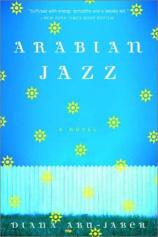Reading Group Guide
Discussion Questions
Arabian Jazz: A Novel

1. When Diana Abu-Jaber started writing Arabian Jazz, she hadn't intended to write a humorous novel, but by the time she finished the first couple of chapters, she realized that it had turned out to be funny on its own. There is a grand tradition of "ethnic humor" in the United States. What are its positives and its negatives? Is there something about different ethnicities or culture clashes that is naturally humorous? Do you find that the immigrant Arab community is treated more lightly than the local one? If so, why? Does humor help us somehow to "survive" the dissonance of being between two cultures?
2. Jemorah lives in two very separate worlds: her Jordanian family and the born-and-bred Americans she went to school with. How do the lifestyles, relationships, families, and destinies of the members of these two communities differ? What is their common ground?
3. Melvina, though she is the younger sister, is very mothering to Jemorah; to her lover, Larry Fasco; and, at times, even to her own father and to aunt Fatima. Aunt Fatima, who has no children of her own and was forced to bury her parents' unwanted babies, claims to be acting as a substitute mother for her nieces. Dolores Otts, mother of an uncertain number of children, kills herself by trying to have an abortion when she is not pregnant, and her only worry on her deathbed is the future of her younger sister, Peachy. How do the different characters experience parenthood? How do they experience brother/sisterhood?
4. Aunt Fatima is one of the most colorful characters in the book. She is sentimental, loud, irrational, and melodramatic. Is she just a cartoon or do you know people like her? If we all have "Aunt Fatimas" in our lives, can we ever explain or cope with them?
5. Compare the men who are offered to the girls in marriage to the ones they find for themselves in the neighborhood. On the one hand we have the Arabs—balding professorial types and the girls' wild Jordanian cousins; on the other are Gil Sesame, Larry Fasco, and Ricky Ellis. Who, among these men, would you want your daughter to marry? Why?
6. What does Melvina's secret relationship with Larry Fasco reveal about her character? Though members of her family must somehow be aware of this relationship (Jemorah sees them dancing together in the garden one night), they seem to ignore it. Why?
7. During a 3:00 A.M. phone call with her father in Jordan, Jemorah agrees to marry her cousin and childhood friend, Nassir. What were the factors that finally led her to say yes? Were you pleasantly surprised or disappointed with her answer? When we meet Nassir a couple of chapters later, did you change your mind?
8. Diana Abu-Jaber was first inspired to write this story when she was out running. She started thinking about the town where she grew up, Euclid, and all the strange characters who lived there. Suddenly she ran into a public building pulled some advertisements off a bulletin board and wrote almost ten pages, sitting there all sweaty. Do you think this sudden, intense inspiration can be detected in her writing style?
9. The book ends with Jemorah hearing Arabian jazz through Ricky's chest as they dance to her father's music. What do you see in this final image? Do you think she will find a way to reconcile the two worlds she belongs to? If so, how?
10. One reviewer referred to the book's "chiaroscuro" quality of mixing light and dark elements, yet felt the book's comedy was too boisterous to support its more serious themes. Do you agree? Would you rather the story were more strictly serious, or more simply comical? If so, why? What would be gained or lost by shifting the balance?
Arabian Jazz: A Novel
- Publication Date: January 16, 2013
- Paperback: 384 pages
- Publisher: W. W. Norton & Company
- ISBN-10: 0393324222
- ISBN-13: 9780393324228








